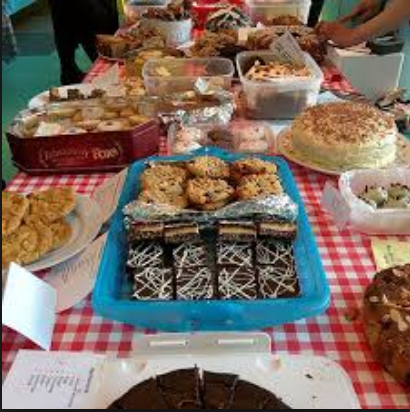Food sale policy: half baked?

October 26, 2017
When debating how to fundraise for clubs or extra-curriculars, bake sale almost always comes up. However, the bake sale policies in place at the federal and state level make it challenging for students to follow through.
According to the USDA, as of 2015 all foods sold on school property during the school day, defined “as the midnight before to 30 minutes after the end of the school day”, must follow Smart Snack regulations.
Regulations require a snack to have less than 200 calories, contain less than 200 mg of sodium, be less than 35% sugar and less than 35% fat. The regulations allow for no trans fat and no more than 10% of calories being saturated fat.
This prohibits the sale of many homemade goods that do not pass the standards, or cannot be verified.
While many students express frustration with this policy, BFA Principal Chris Mosca argues that the policy is a necessary reflection of a national shift towards improving health.
“I liken it to smoking. 50 years ago was the first time, really, that the federal government and the surgeon general put warnings on cigarette labels and said this is harmful and dangerous… I think it’s the same way. The culture is changing. We have to be very mindful,” Mosca said.
Mosca emphasizes the importance of schools demonstrating healthy habits for students. He believes schools need to act as a role model in good nutrition.
“It’s not our job to tell people how to eat or what to eat, but it is important [that] kids get these messages. School policies should reflect that,” Mosca said.
Mosca also brought up safety concerns.
“We have a lot of kids with food allergies and can’t guarantee anybody’s safety around food allergies [with bake sales],” Mosca added.
Cleaning up after bake sales poses a challenge. Any food left after the sale must be cleaned up. Mosca fears that trash and crumbs resulting from poorly dealt with bake sales would attract insects.
“If the foods being sold meets the standards, then you may sell them during the day. However, when the fundraiser includes the sale of food items that do not meet the standards… the fundraiser must be considered an approved exempt fundraiser in accordance with the State agency,” the USDA “Smart Snacks in Schools” fundraising policy states.
Certain programs, like BFA sports teams and the concert bands, have exemptions from the Smart Snack regulations. They are considered separate entities and are allowed to sell food on school grounds.
“The basic guidelines from the MRUSD policy: all foods sold during the school day … must comply with the Smart Snacks Nutrition Standards, which means during the school day there can be no bake sales,” BFA Vice Principal Geoff Lyons said.
However, clubs and extra-curriculars with booster clubs operate outside of school nutrition policy because they have the opportunity to fundraise after school, for instance at band concerts.
“The Booster Club is exempt because they do that at night, in the evening, not in school hours… So it’s all about the time of day, which the guidelines fall within, for groups within a school to sell food,” Lyons said.
Additionally, fundraisers that sell food but do not intend for it to be eaten during the school day are also allowed. This includes the concert band’s Krispy Kreme donut sales and the cookie dough sales, because these products are sold and delivered after the school day has ended.
According to Lyons, school dances are also permitted to serve foods the fall outside of the guidelines, despite being a school sponsored event, due to taking place after the school day has ended.
If clubs want the opportunity to fundraise through bake sales, they need to take initiative.
“It’s up to the group to form a booster club and then to notify us that the club has formed an organisation, if you will, that will help them fundraise for that particular group,” Lyons said.
Despite the administrative go ahead for school dance bake sales, there is still some confusion and conflict over when and where food can be sold.
The school dance food sale exemption was ignored during the 2016-2017 school year’s Winter Ball, when the prom committee’s concession stand was closed.
“I never asked specifically for permission because I assumed that I always had it. Based on past practice at dances, that seemed to be the case,” Mr. Nate Archambault, who coordinated the dance, said.
The committee was selling chips and homemade baked goods to raise money for prom 2017 when they were told they were not allowed to be selling food at a school function.
“We started selling them but then were told that the policy was that we were not allowed to sell food at the dances,” Archambault said.
The student provided foods were confiscated till the end of the dance, when they were returned.
“[This] was a surprise to me because I assumed that because the dance happened after school hours we had freedom to do so,” Archambault said.
Archambault estimates that they lost at least a couple hundred of dollars toward funding 2017 prom.
Archambault also expressed concerns that the bake sale policy had not been clearly communicated to teachers and extracurricular organizers.
“Based upon some things that I’ve currently heard about the policies, I would say no [they aren’t clear]. I’m little fuzzy on them still.” Archambault said.
